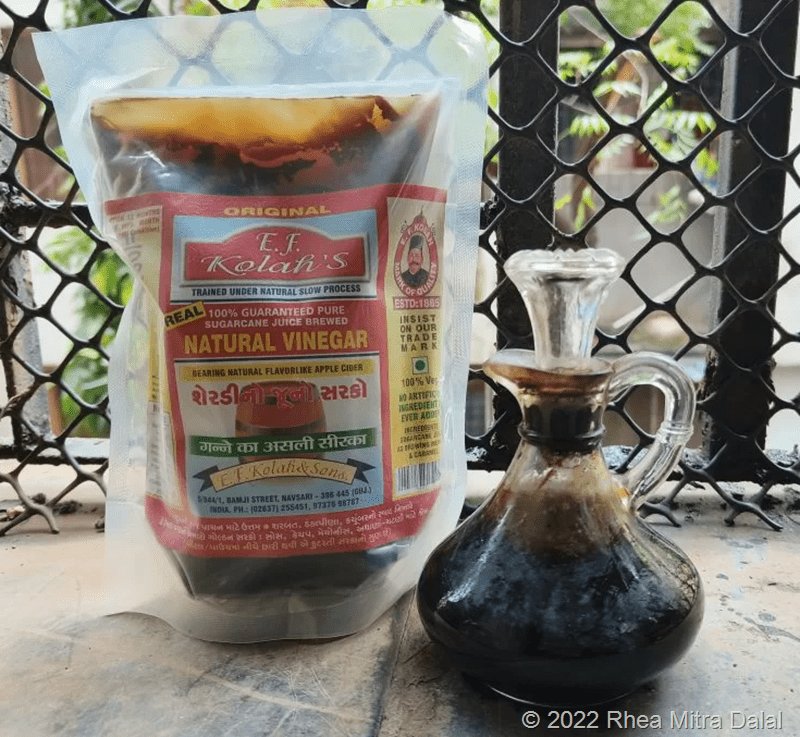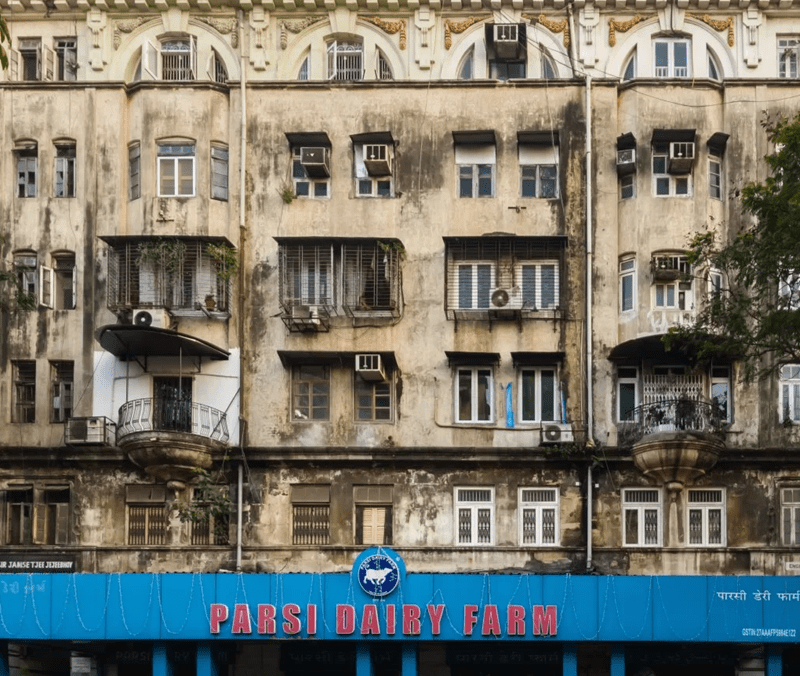The Parsis are divided on their love for their favoured brands of sarko (sugarcane vinegar)—the loyalties don’t waver whether it is vinegar, cookies or dairy products.
A rose by any other name would smell as sweet. But a vinegar by any other initial doesn’t smell as sour—specially if the vinegar in question is the dark, complex sarko (vinegar) used in the Parsi cuisine.
Article by Shabnam Minwalla | Travel Dine
The parsis swear by their love for kolah vinegar. Image: rhea mitra dalal
Take the case of EF Kolah and RE Kolah—two brands of sugarcane vinegars that the Parsis swear by. Both the brands have their setup in Navsari in Gujarat, they make the vinegar in wooden barrels and claim that they both began in the year 1885. But if you imagine that you can substitute a tablespoon of RE Kolah for a tablespoon of EF Kolah, then you clearly don’t know much about Parsi persnicketies or brand loyalty.
“At the beginning of the season I order 10 containers of vinegar, each of about 40 litres,” says wedding caterer Kaizad Patel, a staunch member of the ‘if-it-is-vinegar-it-has-to-be-EF-Kolah club.’ He uses a jar of vinegar every couple of days to flavour numerous dishes and to wash the fish before preparing the classic patra-ni-machhi. “Without sarko it is not Parsi food, which is why I make the arrangements very early on,” he adds.
“Parsi people are extremely particular about the vinegar they use,” agrees caterer and food anthropologist Dr.Kurush Dalal. “Either you are an EF Kolah person or a Framroz Kolah person or a Rustomji Edulji Kolah person. It is a very personal choice. It depends on what floats your boat.”
While the RE Kolah crowd is fortunate that the vinegar—as well as an array of chicken pickles and mango murabbos—are available online, the EF Kolah camp has it harder.
Land up at the shop in Cusrow Baug or Grub Corner at Fort and ask for EF Kolah vinegar, and if it’s your lucky day you might find one measly pouch. If not, you will need to trek to the atmospheric Kerawalla and Co in the by lanes of Dhobi Talao and hope that you get lucky to find it there.
The competing Kolahs and their numerous fish roe pickles, Bombay Duck pickles and lemon-date chutneys are virtually unknown outside the realm of Kerawalla and Sons, Godrej Baug and Zoroastrian.net. Within the community, however, they are celebrated names –prominent among a host of brands that are dearly-held community secrets.
For example, Surat’s Dotivala Bakery remains legendary for its batasa biscuits. Royal Bakery in Pune for its milk bread. Khodiyar Bakery, a progeny of Kayani Bakery, for its cheese papri. Merwan at Grant Road in Mumbai for its unmatched mava cakes. Paris Bakery at Marine Lines for its cheese biscuits and melba toasts and Parsi Dairy Farm (PDF) for anything and everything dairy related.
Parsi dairy farm continues to be a revered institution serving delicious milk products. Image: shutterstock
Each of these institutions comes with a wonderful story. So, PDF—and we’re not using computer jargon here—was established in 1916 by the enterprising Nariman Ardeshir, who started out on the pavement of Princess Street, selling milk that he sourced from cattle sheds in wild and once upon a time remote Jogeshwari. He gradually added products like paneer and ghee and over the next century his heirs added the mithais and milk goodies that are so loved by the Mumbaikars.
Walking into the Parsi Dairy shop at Princess Street is like travelling back to an age when the Bombay dawn was abustle with men in cobalt blue shirts who hurried from building to building with large handas (vessels). They inevitably rang the first doorbell of the day and ladled creamy, foamy milk into waiting utensils. While The Blue Brigade still delivers milk in the early hours to a few loyal customers, however, Parsi Dairy Farm is better known for the goodies sitting in the glass counters of that no-frills shop.
There are cow and buffalo ghee. Matkas of sweet curd so thick that you can cut it with a knife. Flaky, nut-topped sutarfeni, fat Parsi jalebis, the toffee-like Milk Drops. Mava fish with beady red eyes that swim across the city every Parsi New Year. The popular kulfis that, when we were in college, always provided an irresistible excuse to bunk class, just as Rustom Ice Cream at Churchgate, that other beloved and eccentric Parsi brand, ensured that school sports days at Brabourne Stadium were spent on the footpath, munching raspberry of walnut crunch ice cream served between two wafer biscuits.
Anybody who wants to eat like the Parsis must drop in and drool at Parsi Dairy, but don’t stop there. Lug your bag, stuffed with the mava, khaja and cottage cheese you had never planned to buy, and turn onto narrow Cawasji Hormusji Street. Head to the bright red signboard that announces `Kerawalla and Co’ and step into the old-fashioned shop with its wooden counters, plangent portraits and religious artefacts. Contemplate the various pickles and chutneys cooked up by E.F. Kolah, the bottles of rose sharbats, pavs and pattices – and depart with yet another sack of unanticipated shopping.
After which you should walk towards Marine Lines till you reach Paris Bakery. Here you can stock up on crisp khari biscuits and crumbly, buttery cheese biscuits – and then head home for a high tea, Parsi style.



Dear Parsis have arthritis due to this vinegar we know so hope Parsis can keep away from it
All this bringing back olden days when I use to visit all this places Good old days